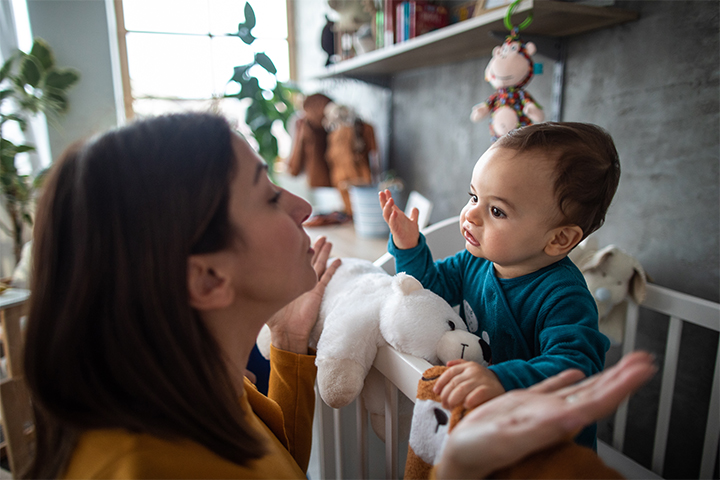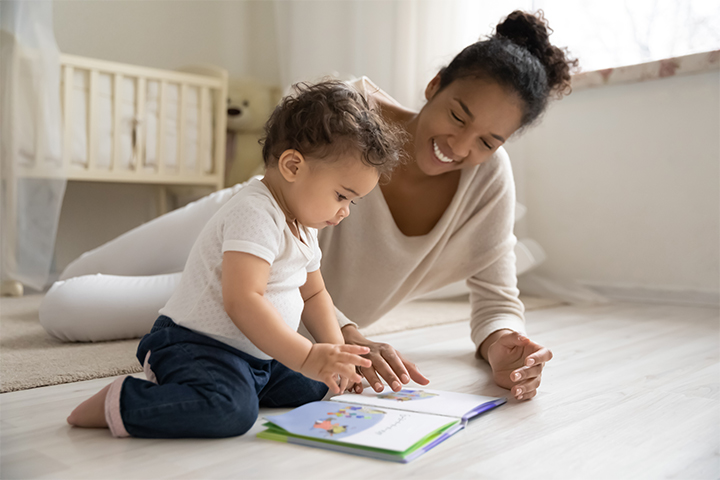
Image: iStock
Your baby may not be the best conversation partner right now, but that’s no reason to not talk to them. In fact, there are many benefits to talking to your little one even when the only thing they can do is look at you cluelessly and smile in response. Sure, it may feel like everything you say is going over their heads, but listening to you talk can do wonders for your baby’s language development. And this is because babies begin to learn language at birth! Incredible, isn’t it? Babies continue to learn, grow, and evolve in multiple ways right from the minute they are born. A recent study concludes that speech and language development start within the first few hours right after birth (1). The study sought to find out if babies really could identify different speech sounds only a few hours after being born. The results showed that the newborns could differentiate vowels presented normally and then presented backwards. Their brain’s response was quicker to forward-produced vowel wounds. So there seems to be more than enough reason to talk to your baby. Here’s how you can encourage your little one’s language development and get them talking sooner.
How To Encourage Your Baby To Talk Early
1. Begin Talking To Them When They Are In The Womb
Studies have shown us that not only is speaking to your baby beneficial for their language development but babies particularly prefer to hear the voice of their mother after birth (2). This is probably because they recognize their voice from the womb. So, if you want your little one to listen to you when they arrive, make sure to read them stories or engage in little chats with them during your pregnancy. It’s a great way to bond with your baby while ensuring the success of their language development.
2. Start Talking To Them Right From Their Birth
Image: IStock
There’s no reason for you to wait until your baby starts to “googoo gaga”, you can start talking to them as soon as they are born. In fact, stimulating your child’s brain with the use of full sentences and good vocabulary will be immensely beneficial for their language development. It’s important to talk to your baby as often as you can in order to facilitate communication development as well. And this holds true, even if their verbal replies, or lack of them, make no sense at the moment. You can simply start a narration or commentary to keep the chat going. Describe how you are making breakfast, where you both are headed to in the morning, or how you are getting them ready for the day. This exercise teaches babies how to imitate and produce the sounds they hear, recognize speech tones, identify different words, and gradually, how to string words together to form sentence structures.
3. Teach Your Baby Signs And Gestures
Now, we all know that your baby is not going to start talking anytime soon, but that doesn’t mean that they can’t communicate with you at all. Using gestures and signs form a big part of non-verbal communication and can help your baby interact with you before they even say their first word. For example, let’s imagine that you and your little one are playing a simple game of blocks and building a tower by stacking them on top of one another. You hand them out the blocks one by one and they may pick up the cue, reaching out and requesting the next block. You could also show them how to use simple pointing motions or made-up gestures to express “this”, “want”, “no”, etc. After that you just need to be patient and encourage your child to follow after you, and then give them their priceless reward!
4. Read Visually Engaging Books Together
Image: IStock
When it comes to helping your baby develop their language skills, nothing beats a good book. Research has shown that kids who see and listen to more diverse words eventually grow up to use them in their speech (3). Another popular study shows that parents reading a single book to their child per day, could teach them 1.4 million more words than other kids who are not exposed to something similar before they start kindergarten (4). So, pick up a book and read to them as they fall asleep. They’ll appreciate the effort and enjoy the quality time they get to spend with you as their vocabulary grows and improves.
We know it can be disheartening to talk to a baby that doesn’t react to anything you’re saying, but don’t give up. Talking to your baby will eventually do them good. And who knows, one of these days they might even crack a smile to the things you say!














